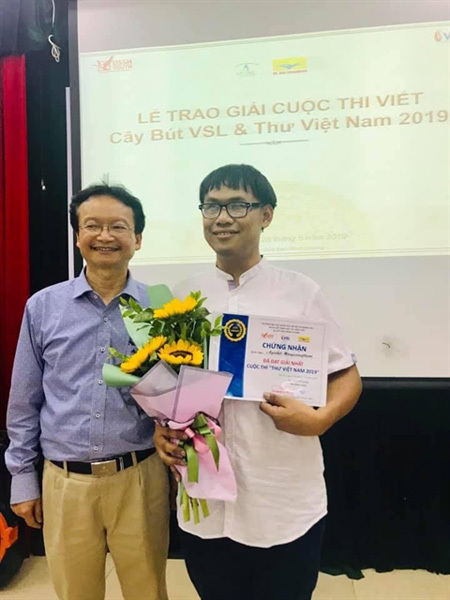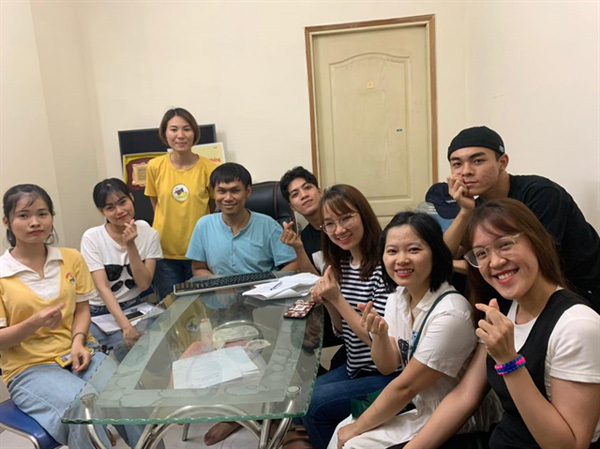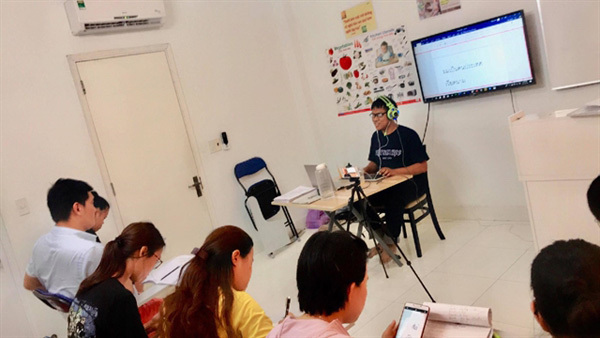 |
| Apichit won the first prize of the Vietnam Letter Contest organised by the Cultural Ambassador Club, University of Social Sciences & Humanities - Vietnam National University, Hanoi in May 2019. — Photo courtesy of Aun Apichit Mingwongtham |
However, Apichit’s passion for Vietnamese has motivated him to overcome all barriers to master the language.
Now, Apichit teaches both Vietnamese and Thai to hundreds of students in HCM City, in addition to managing a Thai club for anyone interested in the language.
Apichit came across Vietnamese at the age of six when he accidentally heard the strange language on the radio.
“The first time hearing Vietnamese, I became instantly interested and curious. I found its intonation beautiful and started to imitate the voice of the speaker though I did not understand a word at that time,” he recalled.
 |
| Apichit (forth from left) is pictured with Vietnamese students in his Thai class. — Photo courtesy of Aun Apichit Mingwongtham |
“Later on, Vietnamese and the country became a special, unexplainable obsession to me. It was until I graduated from law school in Thailand that I had the chance to practise simple Vietnamese with friends I made online.”
In October 2006, Apichit travelled to Hanoi with his friends and family. Though the trip lasted only a few days, it left a huge impression on the then second-year student.
“I was very impressed, particularly with the local cuisine. Each dish is a harmonious combination that creates a unique taste that is very Vietnamese,” he said.
“After a while learning Vietnamese unprofessionally, it became a strange magnet to me that I could not resist. I thought that if I continued to learn like that, I could not thoroughly master the language."
In 2013, 29-year-old Apichit, decided to leave his job in Thailand behind to travel to Vietnam to pursue Vietnamese.
The journey to conquer the language was not always smooth for the visually-impaired man in a strange country. In the first days, he had many difficulties in reading books, finding accommodation and transportation.
“I could not read books like a normal person, which was the biggest difficulty. I had to divide the book into different parts and had my friends type the words on a computer which would then be printed into a Braille book,” he recalled.
It was quite expensive to print the Braille books, in addition to his rent and transportation costs, so Apichit ran out of money after a year and a half, which forced him to go back to Thailand.
 |
| His online and offline students learning Thai have been up to 500 and about another 10 Thai students attend his Vietnamese class. — Photo courtesy of Aun Apichit Mingwongtham |
“I returned to Thailand in August 2014. I really didn’t want to go back while my studies had not yet finished. But the money was gone so I had to go back to work and wait for the next opportunity to go back to Vietnam,” he recalled.
Three years later in 2017, the Thai man returned to Vietnam. He then passed the C2 degree, the highest level of evaluating foreigners’ Vietnamese proficiency, which means his Vietnamese is equivalent to a native speaker.
“However, I wanted to acquire a university degree of Vietnamese studies so I decided to apply for the University of Social Sciences and Humanities, Vietnam National University-HCM City.
“I simply thought that I had to take a serious path at that time in case I could teach Vietnamese to Thais in the future,” Apichit said.
Apichit’s patience and determination paid off and was an excellent student of the Vietnamese Studies department during two years of study at the university. Currently, he has finished all subjects and is awaiting graduation.
To him, Vietnamese is a beautiful language with melodious rhyme.
“It is like a beautiful girl, who is both interesting and arrogant. However, there is a saying that learners often tell each other: Phong ba bão táp không bằng ngữ pháp Việt Nam, meaning struggling in a natural disaster isn't as hard as learning Vietnamese. It is true that Vietnamese grammar is really diverse,” he admitted.
Apichit said he was quite fortunate to have good Vietnamese friends who supported him from his first days in the strange country, helping him to find a place to live and taking him out to visit many beautiful parts of Vietnam and, of course, practise Vietnamese.
He has launched a Facebook page Tiếng Thái Thiết Thực (Real Thai) to teach Thai to Vietnamese and foreigners, in addition to teaching Vietnamese to Thais both offline and online. His Thai language students have numbered to 500 and another 10 students attend his Vietnamese class, which offers him a decent income.
“He teaches the most practical structures of Thai, making it easy for students like me to understand and feel excited in learning both the theory and practice. He is a very devoted teacher,” said one of his students Tran Thuy Tien.
Apichit also runs a club for Thai enthusiasts in HCM City, makes videos for his YouTube channel Tiếng Thái Thiết Thực and writes books about Thai learning.
“In the future, I want to develop my language classes and YouTube channel with the hope that my lectures will support others on the path of conquering Thai.
“Vietnam has become my second home. I really want to stay in the country as long as I can to be able to enrich my Vietnamese and help other Thai learners access authentic and practical Thai as well,” Apichit said. VNS
Luong Thu Huong

More and more foreigners have need to learn Vietnamese
Not only expatriates in Vietnam but also foreign students in all over the world have a need to learn Vietnamese.

Who are the foreign students following Vietnamese studies?
The demand for studying Vietnamese language and Vietnamese culture has been increasing as the country plays an increasingly important role in Asia Pacific and the world.
 Vietnamese is a challenging language for most foreigners, and for a visually-impaired person like Aun Apichit Mingwongtham from Thailand, the challenge was even greater." itemprop="description" />
Vietnamese is a challenging language for most foreigners, and for a visually-impaired person like Aun Apichit Mingwongtham from Thailand, the challenge was even greater." itemprop="description" />